Answered step by step
Verified Expert Solution
Question
1 Approved Answer
Many of us suspect that the beautiful, often highly-edited images of people we see on social media make us feel worse about our own
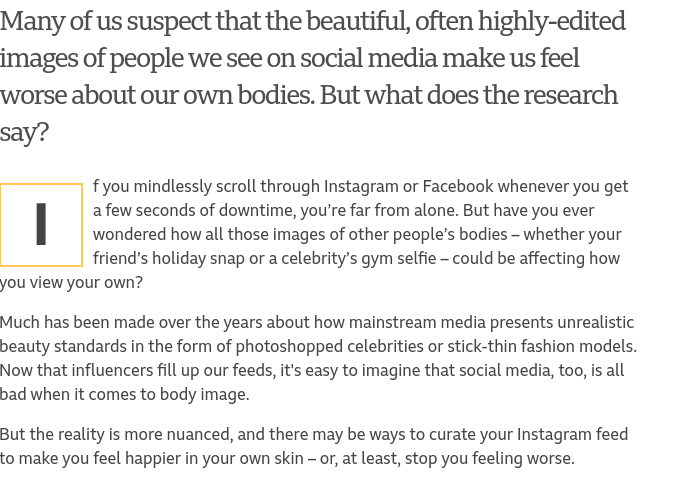
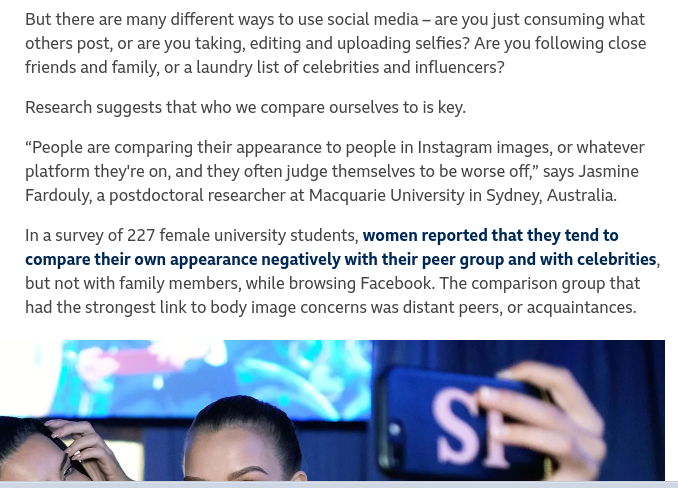
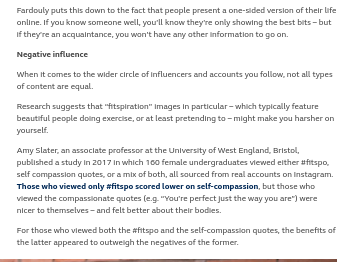
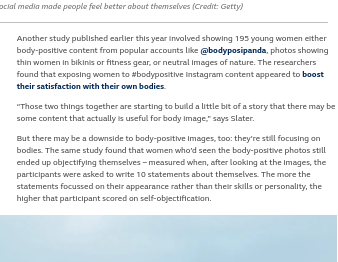
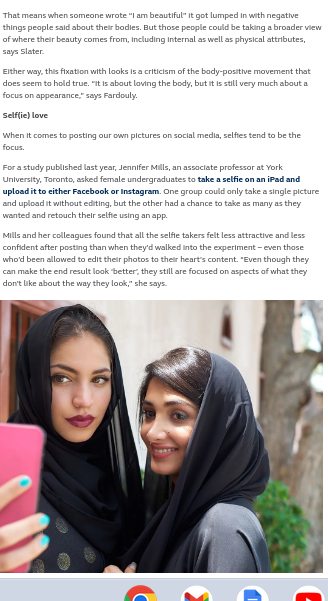
Many of us suspect that the beautiful, often highly-edited images of people we see on social media make us feel worse about our own bodies. But what does the research say? f you mindlessly scroll through Instagram or Facebook whenever you get a few seconds of downtime, you're far from alone. But have you ever wondered how all those images of other people's bodies - whether your friend's holiday snap or a celebrity's gym selfie - could be affecting how you view your own? I Much has been made over the years about how mainstream media presents unrealistic beauty standards in the form of photoshopped celebrities or stick-thin fashion models. Now that influencers fill up our feeds, it's easy to imagine that social media, too, is all bad when it comes to body image. But the reality is more nuanced, and there may be ways to curate your Instagram feed to make you feel happier in your own skin - or, at least, stop you feeling worse. But there are many different ways to use social media - are you just consuming what others post, or are you taking, editing and uploading selfies? Are you following close friends and family, or a laundry list of celebrities and influencers? Research suggests that who we compare ourselves to is key. "People are comparing their appearance to people in Instagram images, or whatever platform they're on, and they often judge themselves to be worse off," says Jasmine Fardouly, a postdoctoral researcher at Macquarie University in Sydney, Australia. In a survey of 227 female university students, women reported that they tend to compare their own appearance negatively with their peer group and with celebrities, but not with family members, while browsing Facebook. The comparison group that had the strongest link to body image concerns was distant peers, or acquaintances. ST Fardouly puts this down to the fact that people present a one-sided version of their life online. If you know someone well, you'll know they're only showing the best bits-but If they're an acquaintance, you won't have any other Information to go on. Negative influence When it comes to the wider circle of influencers and accounts you follow, not all types of content are equal. Research suggests that "fitspiration" Images In particular-which typically feature beautiful people doing exercise, or at least pretending to - might make you harsher on yourself. Amy Slater, an associate professor at the University of West England, Bristol, published a study in 2017 in which 160 female undergraduates viewed either #fitspo, self compassion quotes, or a mix of both, all sourced from real accounts on Instagram. Those who viewed only #fitspo scored lower on self-compassion, but those who viewed the compassionate quotes (e.g. "You're perfect just the way you are") were nicer to themselves and felt better about their bodies. For those who viewed both the #fitspo and the self-compassion quotes, the benefits of the latter appeared to outweigh the negatives of the former. ocial media made people feel better about themselves (Credit: Getty) Another study published earlier this year Involved showing 195 young women either body-positive content from popular accounts like @bodyposipanda, photos showing thin women in bikinis or fitness gear, or neutral Images of nature. The researchers found that exposing women to #bodypositive Instagram content appeared to boost their satisfaction with their own bodies. "Those two things together are starting to build a little bit of a story that there may be some content that actually is useful for body image," says Slater. But there may be a downside to body-positive images, too: they're still focusing on bodies. The same study found that women who'd seen the body-positive photos still ended up objectifying themselves-measured when, after looking at the Images, the participants were asked to write 10 statements about themselves. The more the statements focussed on their appearance rather than their skills or personality, the higher that participant scored on self-objectification. That means when someone wrote "I am beautiful" it got lumped in with negative things people said about their bodies. But those people could be taking a broader view of where their beauty comes from, including Internal as well as physical attributes, says Slater. Either way, this fixation with looks is a criticism of the body-positive movement that does seem to hold true. "It is about loving the body, but it is still very much about a focus on appearance," says Fardouly. Self(ie) love When it comes to posting our own pictures on social media, selfies tend to be the focus. For a study published last year, Jennifer Mills, an associate professor at York University, Toronto, asked female undergraduates to take a selfie on an iPad and upload it to either Facebook or Instagram. One group could only take a single picture and upload it without editing, but the other had a chance to take as many as they wanted and retouch their selfie using an app. Mills and her colleagues found that all the selfie takers felt less attractive and less confident after posting than when they'd walked into the experiment - even those who'd been allowed to edit their photos to their heart's content. "Even though they can make the end result look better, they still are focused on aspects of what they don't like about the way they look," she says. Many of us suspect that the beautiful, often highly-edited images of people we see on social media make us feel worse about our own bodies. But what does the research say? f you mindlessly scroll through Instagram or Facebook whenever you get a few seconds of downtime, you're far from alone. But have you ever wondered how all those images of other people's bodies - whether your friend's holiday snap or a celebrity's gym selfie - could be affecting how you view your own? I Much has been made over the years about how mainstream media presents unrealistic beauty standards in the form of photoshopped celebrities or stick-thin fashion models. Now that influencers fill up our feeds, it's easy to imagine that social media, too, is all bad when it comes to body image. But the reality is more nuanced, and there may be ways to curate your Instagram feed to make you feel happier in your own skin - or, at least, stop you feeling worse. But there are many different ways to use social media - are you just consuming what others post, or are you taking, editing and uploading selfies? Are you following close friends and family, or a laundry list of celebrities and influencers? Research suggests that who we compare ourselves to is key. "People are comparing their appearance to people in Instagram images, or whatever platform they're on, and they often judge themselves to be worse off," says Jasmine Fardouly, a postdoctoral researcher at Macquarie University in Sydney, Australia. In a survey of 227 female university students, women reported that they tend to compare their own appearance negatively with their peer group and with celebrities, but not with family members, while browsing Facebook. The comparison group that had the strongest link to body image concerns was distant peers, or acquaintances. ST Fardouly puts this down to the fact that people present a one-sided version of their life online. If you know someone well, you'll know they're only showing the best bits-but If they're an acquaintance, you won't have any other Information to go on. Negative influence When it comes to the wider circle of influencers and accounts you follow, not all types of content are equal. Research suggests that "fitspiration" Images in particular-which typically feature beautiful people doing exercise, or at least pretending to - might make you harsher on yourself. Amy Slater, an associate professor at the University of West England, Bristol, published a study in 2017 in which 150 female undergraduates viewed either #fitspo, self compassion quotes, or a mix of both, all sourced from real accounts on Instagram. Those who viewed only #fitspo scored lower on self-compassion, but those who viewed the compassionate quotes (e.g. "You're perfect just the way you are") were nicer to themselves and felt better about their bodies. For those who viewed both the #fitspo and the self-compassion quotes, the benefits of the latter appeared to outweigh the negatives of the former. ocial media made people feel better about themselves (Credit: Getty) Another study published earlier this year Involved showing 195 young women either body-positive content from popular accounts like @bodyposipanda, photos showing thin women in bikinis or fitness gear, or neutral Images of nature. The researchers found that exposing women to #bodypositive Instagram content appeared to boost their satisfaction with their own bodies. "Those two things together are starting to build a little bit of a story that there may be some content that actually is useful for body image," says Slater. But there may be a downside to body-positive images, too: they're still focusing on bodies. The same study found that women who'd seen the body-positive photos still ended up objectifying themselves-measured when, after looking at the Images, the participants were asked to write 10 statements about themselves. The more the statements focussed on their appearance rather than their skills or personality, the higher that participant scored on self-objectification. That means when someone wrote "I am beautiful" it got lumped in with negative things people said about their bodies. But those people could be taking a broader view of where their beauty comes from, including Internal as well as physical attributes, says Slater. Either way, this fixation with looks is a criticism of the body-positive movement that does seem to hold true. "It is about loving the body, but it is still very much about a focus on appearance," saysFardouly. Self(ie) love When it comes to posting our own pictures on social media, selfies tend to be the focus. For a study published last year, Jennifer Mills, an associate professor at York University, Toronto, asked female undergraduates to take a selfie on an iPad and upload it to either Facebook or Instagram. One group could only take a single picture and upload it without editing, but the other had a chance to take as many as they wanted and retouch their selfie using an app. Mills and her colleagues found that all the selfie takers felt less attractive and less confident after posting than when they'd walked into the experiment - even those who'd been allowed to edit their photos to their heart's content. "Even though they can make the end result look better, they still are focused on aspects of what they don't like about the way they look," she says.
Step by Step Solution
★★★★★
3.58 Rating (148 Votes )
There are 3 Steps involved in it
Step: 1
The research suggests that the impact of social media on body image is complex and nuanced Here are some key points from the information you provided ...
Get Instant Access to Expert-Tailored Solutions
See step-by-step solutions with expert insights and AI powered tools for academic success
Step: 2

Step: 3

Ace Your Homework with AI
Get the answers you need in no time with our AI-driven, step-by-step assistance
Get Started


